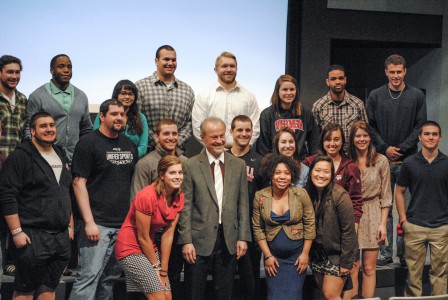Dr. Richard Lapchick spoke Tuesday on the capacity for sports and the ability of the individual to improve social and cultural inequalities rampant throughout the world.
Lapchick’s talk was titled “Addressing Socioeconomic Diversity: The Power of Sport to Heal” and was sponsored by the Office of Diversity and Inclusion and promoted by several student groups.
“You have the power to impact the lives of other people and it is a waste of that power if you don’t use it,” Lapchick said. “It will be a blessing to you if you do use it and will be a blessing to you if you do use it and see the results.”

Photo by Connie Lee.
Lapchick’s interest in the intersection of sports and social issues has been several decades in the making. In Europe for the 1960 Olympic Games, he experienced the astounding ability sport has to cross all lines of color, creed and orientation.
“Sports are the only place where we have the huddle,” Lapchick said. “You get in the huddle and it doesn’t matter [what race, creed, orientation or economic class you come from] you are a team. You can’t win unless you pull together. Imagine if you took that into our classrooms, administrations, into corporate America and the world. Imagine what a place the world could be.”
In the 1970s, Lapchick was an American leader of the sports boycott of South Africa, during the apartheid era. Lapchick’s first win for the battle of social equality was successfully boycotting the South Africa tennis team’s inclusion in the Davis Cup.
“When I [got home] I thought maybe, for the first time, I had done something worthwhile,” Lapchick said of the achievement.
Shortly thereafter, Lapchick was brutally attacked by two masked men and decided to move to New York to work for the United Nations, traveling with an armed guard. Still, he did not waver in his efforts to protest apartheid in South Africa.
Lapchick’s talk also touched on shocking and disturbing statistics related to the state of girls and women’s affairs domestically and worldwide.
“We have a lot of work to do to make life safe for women in this world and life equal in this world for girls and women,” he said.
Lapchick cited statistics regarding violence, hate groups, teen pregnancy, education dropouts, rape, drug usage, child abuse and human slavery as indicative of the work needed to be done, both nationally and internationally.
“It’s why I want to speak to you because the leadership roles you play now and the leadership roles you can play in the rest of your life, you can take on some part of the social justice issues,” Lapchick called out to the Grinnellians in attendance. “You can address them somehow, so that our children, your children, in the community, the nation and the world can have a chance. That you can help build a roof over their dreams that maybe they can someday achieve.”
Lapchick also advised students to take on something that interests them, research and act on it.
“I believe coming from the world of sport … that we have powers in sports that can bring communities together and change attitudes,” Lapchick said.
Lapchick pointed out the spectacular ability of sport to inspire hope in the wake of tragedy. After the September 11 terrorist attacks, the Yankees went to the World Series and the nation rallied, bolstering the belief that New York and the nation could come back from such a grievous event. After the Boston Red Sox won the World Series following the Marathon Bombing last year people cited the team as helping to bring the people of Boston back together.
Internationally, when the Japanese Women’s Soccer Team won the 2011 FIFA World Cup, Japanese citizens called it revitalization after the Tohoku earthquake and tsunami.
“There’s a lot of work to be done, both on a Grinnell College perspective and also from an American perspective in terms of getting ourselves to a place where everybody can be seen in an equitable light,” said Coordinator for Diversity and Inclusion in Athletics Justin Thaxton. “At Grinnell, I can speak to the fact that we are trying to create an athletics community that mirrors that.”
The Pioneer Diversity Council will be continuing the discussion Lapchick started next Monday, April 14 at noon in JRC 226.




















































